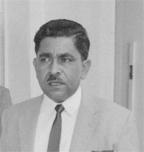Neville Bissember, CCH, March 12, 1928 – May 3, 2008
(Neville James Bissember, attorney-at-law and former cabinet minister in the People’s National Congress administration, died on May 3 aged 80 years.)

Neville Bissember had sealed his status in the People’s National Congress hierarchy and established his reputation as a persuasive party spokesman since 1961. In the elections held in August that year, he won the seat for the Campbellville electoral district in Georgetown and entered the Legislative Assembly. He was also selected as secretary of the PNC’s 11-member legislative group. Here he made his mark as a man of both words and action in September 1962 when the People’s Progres-sive Party administration’s Attorney General Dr Fenton Ramsahoye prematurely presented a new draft constitution.
The draft, disregarding the fact that British Guiana was still a colony, provided for sweeping changes including the attainment of independence, enlargement of the Legislative Assembly and establishment of a republic. Deputising for Opposition Leader Forbes Burnham, Neville Bissember argued that the assembly was not competent to consider such a crucial constitutional matter which was the subject of a forthcoming conference in London. After the speaker allowed the motion, Bissember led the entire opposition, which included the leader Peter d’Aguiar and members of the United Force party, in a walkout. It was a moment of satisfaction as much for the principle as for the action’s popular appeal.
Neville Bissember had entered politics as an ordinary member of the People’s Progressive Party in 1953 soon after qualifying as an attorney-at-law. He had known younger members of Cheddi Jagan’s family at Port Mourant on the Corentyne, not far from where he grew up, and was sympathetic to the party’s programme. But, disillusioned by the schism in the PPP that spawned rival Jaganite and Burnhamite factions in 1955, he sided with neither protagonist.

